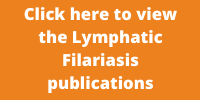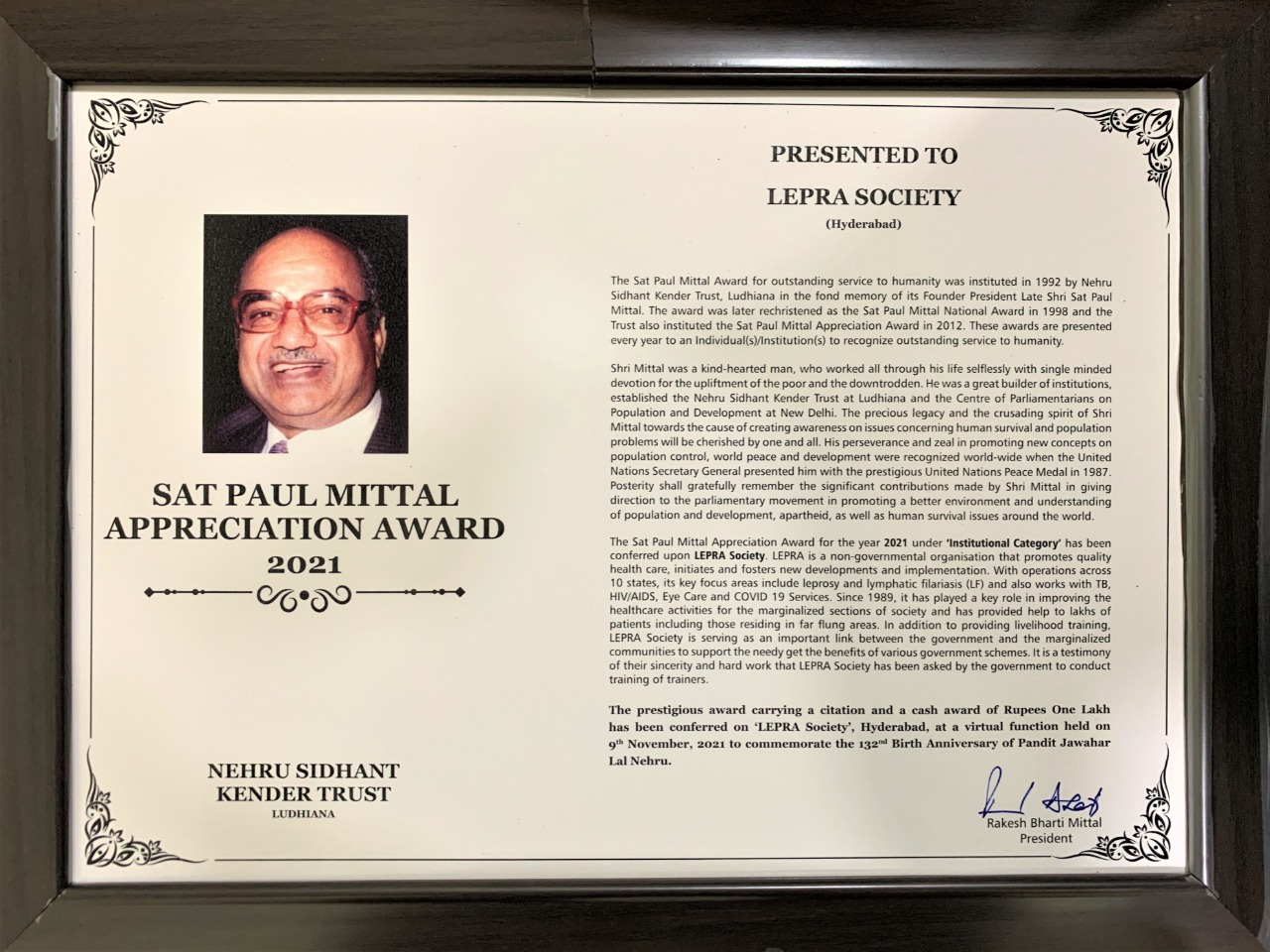Introduction
Dhoolpet Leprosy Referral Centre (DLRC) was transformed into Blue Peter Research Centre (BPRC) in 1997 with the support from Lepra UK and Blue Peter Children Fund. Eventually, the centre has been recognised as Scientific Industrial Research Organisation (SIRO) by the Department of Science and Technology with a state-of the art facility to undertake applied bio medical research in the disciplines of Clinical/ Immunology/ Molecular Biology aspects of leprosy.
In 2010, the public health component was incorporated into BPRC with an emphasis on clinical and epidemiological research in TB, leprosy, and NTDs, of immediate relevance to the people affected.
The Blue Peter Public Health and Research Centre (BPHRC) was established from the funds raised by a BBC television show for children, ‘Blue Peter’. It is a nodal research centre towards implementing organisation strategic research areas Leprosy, Tuberculosis (TB) and, Lymphatic Filariasis. The BPHRC functions in line with the above strategic aim of the LS with a clinic and two laboratories (immunology and molecular biology, Microbiology) as core components within the center. The BPHRC brings uniqueness to LEPRA Society as an NGO with a centrally located laboratory that works closely with clinics and outreach programme across multiple regions in India endemic to leprosy, TB and LF.
Research Governance – Mechanisms governing research at BPHRC are well in place. The Research Advisory Committee (RAC), Institutional Ethical Committee (IEC) and Institutional Biosafety Committee (IBSC) which comprise well-known scientists, doctors, and other socially responsible individuals, oversee the research activities.
Capacity Building
Research training: A wide range of training programmes for undergraduates, postgraduates and post-doctoral researchers to develop knowledge and skills are offered. The research-based teaching and hands-on training offered to the trainees, the state-of-the-art equipment and well-equipped labs, serve as the basis for attracting and holding on to young researchers.
Academic and Technical training: Medical education programme for medical graduates and post-graduates. Skill enhancement training for field and laboratory staff working on leprosy and TB.
Dissemination of knowledge: The knowledge accrued is disseminated through peer reviewed journal publications at national and international levels (84), presentations at various conferences (45) and community awareness programmes (45).
| S No | Test Name & Method | Specime Type | Volume | Schedule (Mon-Sat) | Specimen Transport Temperature | TAT
(Turn Around Time) |
Cost of the Test INR |
| 1 | COVID RT PCR | Nasopharyheal, Oral Swab | Daily at 3.00 pm | 4°C upto 24 hours | 48 hrs. | 500.00 | |
| 2 | SARS CoV-2 Neutralising Antibody Test by ELISA | Plasma/ Serum | 3 ml | Mon, Thursday | 4°C upto 24 hours | 48 hrs. | 500.00 |
| 3 | AFB Stain for Mycobacterium tuberculosis (ZN Stain) | Sputum, Pus, Tissue, Body Fluids | 3-5 ml | Daily at 3.00 pm | Room Temperature <6 Hrs., 4°C upto 24 hours | 24 hrs. | 200.00 |
| 4 | AFB Stain for Mycobacterium leprae by Slit Skin Smear Preparation (Modified ZN Stain) | Sputum, Pus, Tissue, Body Fluids | 3-5 ml | Daily at 3.00 pm | Room Temperature <6 Hrs., 4°C up to 24 hours | 24 hrs. | 200.00 |
| 5 | Mycobacterium tuberculosis culture by BACTEC MGIT | Sputum, Pus, Tissue, Body Fluids | 3-5 ml | Daily at 3.00 pm | Room Temperature <6 Hrs, 4°C up to 24 hours | 6 weeks | 900.00 |
| 6 | Non-Tuberculous (Atypical) Mycobacteria Culture | Sputum, Pus, Tissue, Body Fluids | 3-5 ml | Daily at 3.00 pm | Room Temperature <6 Hrs, 4°C up to 24 hours | 2 week | 900.00 |
| 7 | First Line Drug Susceptibility Testing for Mycobacterium tuberculosis by Culture (MGIT) | Specimen, Culture | 3-5 ml | Daily at 3.00 pm | Room Temperature <6 Hrs, 4°C up to 24 hours | 3 weeks | 4500.00 |
| 8 | Second Line Drug Susceptibility Testing for Mycobacterium tuberculosis by Culture (MGIT) | Specimen, Culture | 3-5 ml | Daily at 3.00 pm | Room Temperature <6 Hrs, 4°C up to 24 hours | 3 weeks | 4500.00 |
| 9 | First Line Drug Susceptibility Testing for Mycobacterium tuberculosis by Line Probe Assay | Specimen, Culture | 3-5 ml | Tue, Fri | Room Temperature <6 Hrs, 4°C upto 24 hours | 72 hrs | 2000.00 |
| 10 | Second Line Drug Susceptibility Testing for Mycobacterium tuberculosis by Line Probe Assay | Specimen, Culture | 3-5 ml | Tue, Fri | Room Temperature <6 Hrs, 4°C up to 24 hours | 72 hrs | 2000.00 |
| 11 | TB Quantiferon Gold Assay | Lithium Heparin Whole Blood | 5 ml | Wednesday | Room Temperature <6 Hrs, 4°C up to 24 hours | 1 week | 2000.00 |
| 12 | Drug Resistance Testing for Lepra Bacilli by PCR and Gene sequencing | Slit skin smear, Tissue | NA | Thursday | Room Temperature <6 Hrs, 4°C up to 24 hours | 2 week | PCR – 1500.00
Gene sequencing – 3000 |
Background:
LEPRA Society is a non-governmental organisation that focuses on health improvement activities in the community that are marginalised or poor, especially women and children, young people, slum populations and migrants affected by Leprosy, Tuberculosis, HIV, Filariasis, COVID 19 and tries to bring about positive changes in their life-style in close coordination with the Government of India, Ministry of Health, and Family Welfare, at the Central, State and District levels. Blue Peter Public Health & Research Centre (BPHRC) is the laboratory and research wing of LEPRA society and has a state of the art laboratory facility for various laboratory investigations and research projects in the field of Microbiology, Mycobacteriology, Molecular Biology and Serology.
Credentials:
Our Laboratory Services are accredited to the Central TB division, GoI; Central Leprosy Division, GoI and NABL, QCI. BPHRC is recognised by Department of Scientific and Industrial Research Organisation (DSIR), GoI as a Scientific and Industrial Research Organisation for research work in infectious diseases which is governed by Technical Advisory, Biosafety and Institutional Ethics committees comprising of expert and world renowned biomedical scientists, physicians, laboratory professionals, social scientists and ethics experts.
Facility:
BPHRC houses a Biosafety Level -3, which is certified by the Department of Biotechnology, GoI , for working on TB, COVID and other respiratory pathogens. The centre is equipped with conventional and Real time PCR, ELISA, cell cultures, microscopy, staining, bacteriological culture and antibiotic sensitivity testing. The center has out- patient clinic with in-house full time physician and caters to the medical needs of our beneficiaries, while serving as a resource center for our trainings and researches. We have a dedicated and trained team of Microbiologists, Research Scientists, Physicians, Clinical Epidemiologist, Physiotherapists, Laboratory and Molecular Technologists, Project Manager and Outreach Social Workers who strive for excellence through continuous up gradation of knowledge and skills.
Research:
While the core research facility is supported by Lepra, Colchester, UK and the research projects are funded through national and international extra mural institutes including ICMR, DST-SERB, DBT and NIH, USA, RSTHM, UK. We work in collaboration with health programmes and academia including national and international universities. Research findings are being disseminated through peer reviewed publications, technical forums and conferences and meetings. Current research areas include early detection, molecular diagnostics, antimicrobial resistance and socio behavioural research.
Skill building:
BPHRC envisages disseminating its knowledge and expertise in the thematic areas through building skills and encourage young researchers. A wide range of training programmes are offered for undergraduates, postgraduates and postdoctoral researchers in the areas of medicine, pharmacy, biotechnology and life sciences. The research-based teaching and hands-on training offered to the trainees, the state-of-the-art equipment and well-equipped labs, serve as the basis for the hands on training programmes.
Contact us at bphrc@lepraheathinaction.in
For more details contact:
Dr. Aparna Srikantam, M.D
Head – Research
LEPRA Society – Blue Peter Public Health & Research Centre
Near TEC Building, Cherlapally,
Hyderabad – 501 301, India.
Phone: + 91 40 27264547, 27261262
Fax: +91 40 27264547
Email: aparna@leprahealthinaction.in, bphrc@leprahealthinaction.in
Current Research Projects
| S. No | Title of the Project | Funding Agency | Time lines |
|
1 |
Molecular characterization of microbial flora and signature metabolites with reference to clinical outcome of infected chronic foot ulcers in leprosy and diabetes | Indian council of Medical Research (ICMR), Government of India (GoI) |
2020- 2023 |
|
2 |
A step towards unraveling bacterial biofilm formation through quorum sensing (QS) antagonism – Leprosy plantar ulcer model | Indian council of Medical Research (ICMR), Government of India (GoI) |
2019-2022 |
|
3 |
Mycobacterial gene expression in relevance to treatment outcome of Pulmonary TB patients | Department of Science and Technology (DST)- Science and Engineering Research Board (SERB), Government of India (GoI) |
2020-2022 |
|
4 |
Anti-microbial peptides (bacteriocins) as alternative to conventional antimicrobial agents- novel interventional study for treating infected plantar ulcers in leprosy and diabetes |
Indian council of Medical Research (ICMR), Government of India (GoI) |
2018-2021 |
|
5 |
Assessment of psychosocial impact of clofazimine induced skin pigmentation in leprosy patients |
Royal Society of Tropical Medicine and Hygiene (RSTHM), UK. |
2020-2021 |
Major Projects Completed Recently
|
S. No |
Title of the Project |
Funding Agency |
|
1 |
Prevalence of leprosy related disabilities post-leprosy treatment: A vertical study | Robert Luff trust, UK |
|
2 |
Holistic approach to prevention and control of leprosy in a marginalized community | Verity Knowledge Solutions, India |
|
3 |
Application of plate rich fibrin in chronic plantar ulcers of leprosy- a pilot interventional study. | Indian council of Medical Research (ICMR), Government of India (GoI) |
|
4 |
Bacterial biofilm and its implications in clinical outcome of chronic plantar ulcers in leprosy. | Department of Science and Technology (DST)- Science and Engineering Research Board (SERB), Government of India (GoI) |
|
5 |
Molecular epidemiology and host susceptibility of morbidity and co-morbidity of Bancroftian filariasis in endemic states of India- a community-based study |
Indo- German International Research and Training Group, Germany. |
|
6 |
A Study on quality leprosy services provided including reactions at the PHC level in an integrated set up in Andhra Pradesh | Indian council of Medical Research (ICMR), Government of India (GoI) |
|
7 |
Occurrence of relapse, non-responsiveness to treatment in leprosy and screening of M. leprae isolates for drug resistance using molecular and mouse foot pad techniques | Indian council of Medical Research (ICMR), Government of India (GoI) |
|
8 |
Evaluation of molecular methods (PCR, Immunohistochemistry) against conventional methods (histopathology, culture, AFB staining in endometrial samples) and laparoscopy in detection of genital tuberculosis infertile women (FGTB) (2012-15) | Indian council of Medical Research (ICMR), Government of India (GoI) |
|
9 |
A longitudinal cohort study to identify Immunological Biomarker for Leprosy |
Indian council of Medical Research (ICMR), Government of India (GoI) |
|
10 |
Gene Expression profiling in multi-case leprosy families: “The susceptibility genes” expression through general proteomics approach” |
Indian council of Medical Research (ICMR), Government of India (GoI) |
|
11 |
Role of Vitamin D on T regulatory cells in Leprosy spectrum | Royal Society of Tropical Medicine and Hygiene (RSTH), UK. |
|
12 |
Determine Immune Based Interventions That Can Enhance NK Cell & T-Cell Functions in HIV+ Persons with TB |
Indian council of Medical Research (ICMR) and National Institute of Health (NIH) |
|
13 |
Identify immunologic markers of persons at highest risk of progression of latent tuberculosis infection to tuberculosis | Department of Biotechnology (DBT), GoI and National Institutes of Health (NIH), US. |
|
14 |
Th1/Th2 immune homeostasis in Tuberculosis and Asthma: Effect of circulating regulatory cytokines on T cells |
Indian council of Medical Research (ICMR), Government of India (GoI) |
Other projects
|
S.No. |
Title of the Project |
Funding Agency |
|
1 |
Mobile Integrated Health Project – COVID-19 |
Effect-Hope, Canada and Lepra, UK |
|
2 |
Covid-19 Testing in India |
Rotary International, Rotary Stratford London and Rotary Jubilee Hills Hyderabad. |
Institutional Board:
Research at Blue Peter Public Health and Research Centre (BPHRC) is supervised by three separate bodies.
-
- Technical Advisory Committee (TAC)
- Institutional Ethics Committee (IEC)
- Institutional Biosafety Committee (IBSC)
1.Technical Advisory Committee (TAC):
The committee meets annually with the following objectives:
-
- Guiding the overall direction of research
- Identifying priority areas for research
- Approval and monitoring of scientific proposals
- The following are the members of TAC:
Dr. V.M. Katoch, Chairperson, NASI- ICMR Chair on Public health Research at Rajasthan University of health Sciences, Jaipur; President of Jawaharlal Institute of Postgraduate Medical Education and Research, Puducherry; President of All India Institute of Medical Sciences (AIIMS), Madurai; Former Secretary of Department of Health Research, Govt of India; Chairman-LEPRA Society, Hyderabad.
Lt Gen. (Retd.) Dr. V.D. Tiwari, Member, Former Commandant of Armed Forces Medical College, Pune.
Prof. R.K. Mutatkar, Member, Former Head of the Department of Anthropology and Former Director, Inter-disciplinary School of Health Sciences, Savitribai Phule Pune University, Maharashtra
Prof. Diana NJ Lockwood, Member, Professor of tropical medicine, London School of Hygiene and Tropical Medicine (LSTMH), London.
Dr. Utpal Sengupta, Member, Emeritus Medical Scientist (ICMR), Consultant, Stanley Browne Research Laboratory, The leprosy Mission, New Delhi.
Lt. Gen. (Retd.) Dr. M. A. Tutakne, Member, Former Vice Chancellor, Symbiosis International University, Pune.
Dr. Aparna Srikantam, Convenor, Head Research, Lab Director, LEPRA-BPHRC, Hyderabad.
2. Institutional Ethics Committee (IEC):
It is registered with Department of Health Research (GoI)- National Ethics Committee registry for biomedical and Health Research
The committee meets based on the need and requirement with the following objectives:
-
- To review biomedical research projects to safeguard the dignity, rights, safety and well-being of the volunteers- patients and healthy subjects.
The following are the members of IEC:
Justice B. Prakash Rao, Chairman, Former Acting Chief Justice of High Court of Telangana and Andhra Pradesh.
Dr. Uday Kumar, Vice chairman, Scientist ‘G’ Dy. Director, National Institute of Nutrition (NIN), Hyderabad.
Dr. G. Sham Sunder, Member, Former Vice Chancellor, NTR University of Health Sciences, Vijayawada
Dr. Shiva Sai, Member, Head, Medical Biotechnology, Sree Nidhi Institute of science and technology, Hyderabad.
Dr. Ananth Reddy, Member, Chief Administrator, Sivananda Rehabilitation Home, Hyderabad.
Dr. Chakrapani Chatla, Member, Manager-Public Health, Novartis, Hyderabad.
Mr. Anand Akundy, Member, Assistant Professor, Governance & Public Policy, Institute of Public Enterprise
Dr. Michael Sukumar Pallapati, Member, Research Medical Officer, LEPRA-BPHRC, Hyderabad.
Mr. Prasad, Community Member, Malkajgiri, Hyderabad
Dr. Aparna Srikantam, Convenor, Head Research, Lab Director, LEPRA-BPHRC, Hyderabad
3.Institutional Biosafety Committee (IBSC):
The committee meets twice in a year with the following objectives:
-
- To review the status of the rDNA and other biosafety related aspects of the research projects in the institution.
The following are the members of IBSC:
Dr. P. Uday Kumar, DBT Nominee, Scientist ‘G’ Dy. Director, National Institute of Nutrition (NIN), Hyderabad.
Dr. KSR Siva Sai, Member, Head, Medical Biotechnology, Sree Nidhi Institute of science and technology, Hyderabad.
Dr. Sangita Mukhopadhyay, Member, Head, Molecular Biology Group, Centre for DNA, Fingerprinting and Diagnostics (CDFD) Hyderabad.
Dr. I. Christiana, Member, Immunologist, LEPRA-BPHRC, Hyderabad.
Dr. Michael Sukumar, Member Secretary, Research Medical Officer, LEPRA-BPHRC, Hyderabad.
Dr. Aparna Srikantam, Chairman/Biosafety Officer, Head Research, Lab Director, LEPRA-BPHRC, Hyderabad.
Collaborations
| National | International |
|---|---|
|
|
Extra –Mural Funding Bodies
| National | International |
|---|---|
|
|
Accreditations and Recognitions
- Department of Scientific and Industrial Research (DSIR).
- National Accreditation Board for Testing and Calibration Laboratories (NABL)
- Central TB division, Ministry of Health and Family Welfare (MoHFW), Government of India (GoI).




